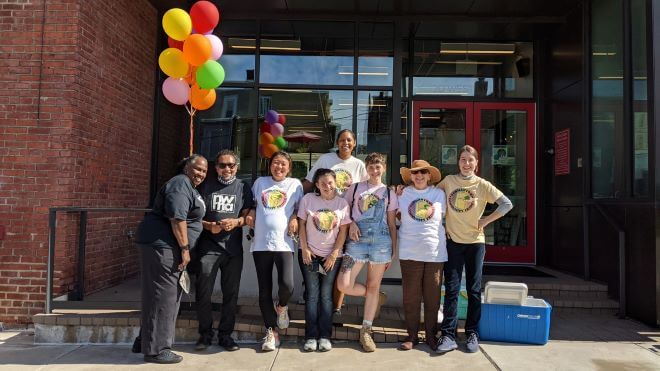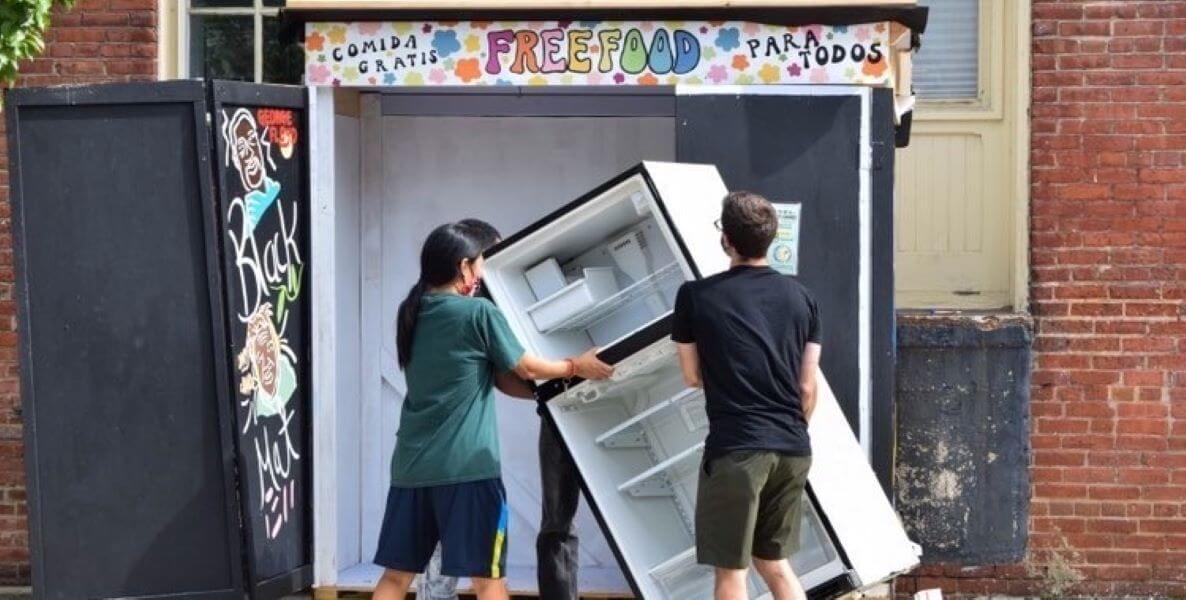By now, most of us know what a community fridge is: a freestanding refrigerator stocked with food that anyone can take, anytime, no questions asked. Nowadays, Philly has a whole network of them. But at the start of the pandemic, as New Yorkers and Los Angelenos started installing them, Germantown was community fridge-less.
Until Jane Ellis came around.
In 2020, Ellis established the first of two fridges in Germantown in response to Covid, the neighborhood’s higher-than-the-rest of the city poverty rate (almost 30 percent), its status as a food desert — and a post she saw on Instagram about a community fridge in Brooklyn. Today, the original Germantown Community Fridge stands outside of the Greene Street Friends School, where she was an elementary school teacher and is dean of grades 4 through 8 and co-director of the Teaching Associate Program. The second is outside Germantown United Methodist Church.
Both, she says, are a testament to the city’s food insecurity crisis, but also to the idea of mutual aid, which is, in a nutshell: When one community helps another, and one community benefits in a tangible sense, and both benefit spiritually. Or, as Ellis says, “Everyone wins.”
“I have learned so much about the value of community. I really want it to be incorporated in all that I do, even my paid job. I think it’s one of my core values now — just like how to give back to my community. And I think it all started with the fridges,” says Ellis.
Two years later, Ellis still oversees the fridges, which have inspired her to find more ways to give back. The Citizen checked in with her to learn more about what it means to be in a community of helpers. The interview has been condensed and edited.
What was it like when you first started the fridge in 2020?
When we were first wheeling the fridge over into the shed, this guy was walking by with his dog and asked what we were doing. I explained the concept to him — and he told me that the fridge was going to get stolen within a week.
I was really nervous in the beginning. At first, I would check on the fridge two or three times a day. Since then, since people have come and gone and used it and told other people about it, people have become protective of it. Now it seems like a staple in the community.
When you think about something that’s 24/7, with no one watching it, you have to trust people to use it in the way that it’s meant to be used. Sure, there are times when it gets trashed, but those are really just the 1 percent. Most of the people are using the fridge in the right way — as a community resource.
How many people have you served? How much food have you given away?
We take pride in the fact that we actually don’t know how many people have used the fridge and how much food is going in and out. Our goal is to keep filling up the fridges as much as possible. We are not here to count and tout how many exact people we’ve served or pounds of food we’ve donated.
The fridges are for anyone and everyone, so it’s hard to make an assumption of who it is primarily serving. Its goal and aim is to fight food excess and food insecurity, but it is open to anyone.
Speaking of food excess: How do community fridges contribute to sustainability?
A lot of the times when people think of the fridges, they’re thinking the fridge is able to provide that food, which is great. In the bigger scheme of things, we work with a lot of organizations such as restaurants and bakeries and grocery stores that actually have so much excess food that would actually go to waste.
In grocery stores there are very strict laws. Once an item comes very close to the best-buy or sell-by date, they can’t have it out for sale. Stores will then donate that food to the fridges. There are a ton of places that throw out all of the extra food they have. It is really nice to be able to link up that otherwise wasted food with people who need it — and so that it’s not going into the trash.
Is there a favorite story you have about the fridges?
I feel like everyone that I talk to who has gone to the fridges to volunteer or donate food, they always say the best part is running into other community members and getting to know new people they otherwise honestly never would have met. It’s nice to take the time out to have a conversation with someone that you might have not had a conversation with, while you’re helping out your community. I feel like it is a really beautiful thing.
A man named James was coming to the fridge a lot. One time I suggested that he take a can of beans which would go well with the other items he was taking. He told me, “Oh, I don’t have a can opener. So I never take any of the cans.” It seemed like such a simple thing that I’ve taken for granted — and probably most of us take for granted — that you have a can opener at home. It’s something that I never would’ve thought of if I didn’t have that conversation with him.
That conversation allowed for action steps, and can openers are now something we put on the donation list. Also, when we ask people to shop for groceries, to buy the cans with the little pop-up tabs. It made me think more about the situations that all different people are dealing with.
What do you think is the future of community fridges?
It’s a huge question. Just the fact that you can find so many of these fridges now, within a couple of blocks from where you live in Philadelphia, is already a huge start. Two years ago, when I started this fridge, there were only the three of us — ours, and the South Philadelphia Community Fridge and the Fridge on 52nd. Now fridges are popping up everywhere, even outside the city.
For me personally, I’ve thought about: How can we make something like this bigger? How could we open up a cafe where we hire people from the community who are in need of work, and the things that we sell there are pay-what-you-want? And then figuring out: how can we make this a whole community? Maybe in the backyard of the cafe, we could have a garden that works with schools who are learning about growing your own food.

Ideas like this make me really excited, but also make my head hurt too, because there’s so many systems and structures that would be involved. At the end of the day, I think people have this feeling in their heart that the community is an important thing, and I think people will get creative with ideas of how to help their community.
I’ve been lucky enough that my avenue has started with the fridges. I’m hoping in the future, other people will think of other ways and other creative ways to support and collaborate to give back to the community. I’m hoping the future holds more creative ways in which people continue to do works of mutual aid.
So how can we all help?
One of the things people can do is volunteer to do a check-in, which just requires going to the fridge and wiping off the fridge and pantry. You can also sign up to do a deeper cleaning.
If there are organizations around you that you think have food excess that you want to connect with your local fridge, that’s something you can do. Also, when you go grocery shopping, if there are one or two extra items that you want to pick out and donate, that’s something you can do.
For some people, the easiest way to help out is to donate money through Venmo or CashApp which goes right to grocery shops.
Finding one little way to help a fridge and incorporating it into your schedule is the best way to do it. When each person does that, it ends up becoming this bigger thing, a whole network of community members working together.
What have the last two years taught you?
I’ve learned a lot of technical things about electricity and how a fridge works. So many of those things you don’t think about when you start a community fridge, like, I’m putting a fridge outside, but now you’re putting a trash can, so who’s picking up that trash? How do you make food outside safe?
For me, the most fun part is: How do you collaborate with your community in creative ways that allow their strengths to really flourish? It’s been fun to have people say “Hey, I’m a senior at my high school and I run this club, and I want to figure out ways to contribute to the fridge.” There are people saying, “We should have a sign-up so that families can donate sandwiches every week.” Other people are like, “I can paint. Can I paint the fridge?”
I love that the fridge has allowed for so many different ways for people to be involved with the way they want to be involved.
I have learned so much about the value of community. I really want it to be incorporated in all that I do, even, even my paid job. I think it’s one of my core values now — just like how to give back to my community. And I think — I think — it all started with the fridges.

![]() MORE ON FIGHTING FOOD INSECURITY FROM THE CITIZEN
MORE ON FIGHTING FOOD INSECURITY FROM THE CITIZEN
MOST POPULAR ON THE CITIZEN RIGHT NOW
Setting up a refrigerator. Photo via Germantown Community Fridge



